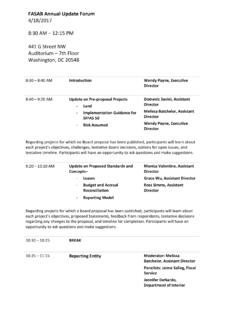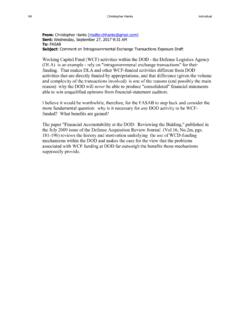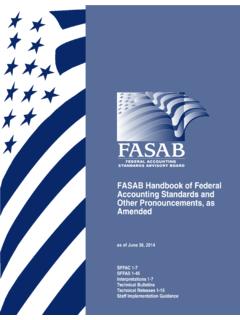Transcription of FEDERAL ACCOUNTING STANDARDS ADVISORY …
1 1 FEDERAL ACCOUNTING STANDARDS ADVISORY board board Meeting Minutes December 20, 2017 Room 7C13 441 G Street, NW Washington, 20548 Wednesday, December 20, 2017 .. 1 Attendance .. 1 Administrative Matters .. 1 Approval of Minutes .. 1 Updates and Clippings .. 2 Agenda Topics .. 3 Closed Session .. 3 Inter-entity Costing .. 3 Streamlining .. 4 6 Adjournment .. 7 For research purposes, please see the briefing materials at Briefing materials for each session are organized by tab; references to these tabs in the minutes are hyperlinked. Wednesday, December 20, 2017 Attendance The following FEDERAL ACCOUNTING STANDARDS ADVISORY board (FASAB or the board ) members were present throughout the meeting: Mr. Showalter (chairman), Mr. Bell, Ms. Bronner, Messrs. Dacey, Granof, Reger, Scott, and Smith. Mr. McNamee was present with the exception of the morning of December 20th.
2 The executive director, Ms. Payne, and general counsel, Ms. Motley, were also present throughout the meeting. Administrative Matters Approval of Minutes The board approved the October meeting minutes prior to the meeting. 2 Updates and Clippings Mr. Showalter acknowledged Mr. Reger for his service on the board and congratulated him on his pending retirement. Members noted the significant and lasting contributions Mr. Reger has made to FEDERAL financial reporting and management during his tenure on the board . Mr. Showalter reminded members that member evaluations and independence confirmation forms are due by January 17. Written evaluations are requested for members eligible for a second term Ms. Bronner and Messrs. McNamee and Scott. Mr. Showalter will contact members regarding oral evaluations for other members. Mr. Dacey provided an update regarding the International Public Sector ACCOUNTING STANDARDS board (IPSASB).
3 He noted the following activity: Approval of an exposure draft (ED) proposing STANDARDS for leases Approval of consultation on the overall strategy and work plan Deliberation regarding responses to the consultation paper on heritage items Development of public-sector measurement guidance that would consider conformity with current concepts Mr. Granof provided an update regarding the Governmental ACCOUNTING STANDARDS board . He noted the following activity: Issuance of EDs proposing o interest cost during construction of an asset not be capitalized, o implementation guidance updates, and o other post-employment benefits implementation guidance. Deliberation on new STANDARDS for conduit debt for which liability recognition would be similar to recognition for financial guarantees Consideration of comments on the ED regarding debt disclosures Development of reporting model options Deliberation on an invitation to comment on two approaches to revenue and expense recognition one approach is similar to the current 3 exchange/non-exchange models and another would adopt a performance obligation model Consideration of the technical agenda Agenda Topics Closed Session The board met in closed session from 9:00 10:00 am.
4 The reason for the closure was that matters covered by 5 552b(c)(1) were discussed. The discussion involved matters of national defense concern that have been classified by appropriate authorities pursuant to Executive Order. A determination has been made in writing by the Government Accountability Office, the Department of the Treasury, and the Office of Management and Budget, as required by section 10(d) of the FEDERAL ADVISORY Committee Act, 5 App., that the portion of the meeting may be closed to the public in accordance with 5 552b(c)(1). Inter-entity Costing Ms. Melissa Batchelor, assistant director, explained the purpose of the session was to discuss responses to the ED, Amending Inter-entity Cost Provisions, and staff s subsequent analysis. These materials were included in the briefing materials at tab A. Mr. Showalter explained that the goal of the session was to approve the edits and distribute a pre-ballot draft after the meeting.
5 The board could then approve a ballot Statement at the February 2018 meeting. He explained that members must resolve all technical matters during the meeting in order to move to a pre-ballot. A majority of respondents generally agreed with the proposal to revise Statement of FEDERAL Financial ACCOUNTING STANDARDS (SFFAS) 4, Managerial Cost ACCOUNTING STANDARDS and Concepts, to provide for recognition of inter-entity costs by business-type activities and to rescind SFFAS 30, Inter-entity Cost Implementation: Amending SFFAS 4, Managerial Cost ACCOUNTING STANDARDS and Concepts, and Interpretation 6, ACCOUNTING for Imputed Intra-departmental Costs: An Interpretation of SFFAS No. 4. Further, a majority of respondents generally agreed that component reporting entities should provide a concise statement to acknowledge significant services received for which no cost is recognized.
6 Respondents also agreed that the proposed disclosure would not impose a greater cost or burden when compared to existing requirements. Ms. Batchelor had received feedback from members prior to the meeting and distributed an updated proposed Statement. She provided a brief overview of the clarifying edits that were made in the document. Question 1 Comments, questions, and feedback on comment letters. One member was concerned about (1) the cost of determining whether unreimbursed inter-entity costs are significant and (2) whether the proposed disclosure provides a 4 meaningful distinction between entities with and without significant inter-entity costs. Therefore, the member suggested the board consider amending paragraph 5 to require disclosure for all non-business-type entities that only certain intra-entity costs are recognized for goods and services received from other FEDERAL entities at no cost or at a cost less than the full cost; and replace the example wording.
7 The member also suggested the board consider changing paragraph 111 to address perceived wording inconsistencies; and adding a sentence, perhaps at the end of paragraph 6, to clarify that entities may elect to recognize imputed cost and corresponding imputed revenue for other types of inter-entity costs. The board agreed to the suggestions but did have wording changes. In addition, the board discussed the placement of the final language, as certain changes will be in SFFAS 4, as amended, and others will be in the new Statement. Staff will determine the best placement when sending the next draft. One member also requested changing the standard language to earlier implementation is permitted instead of encouraged. Next steps: Staff will provide members a pre-ballot draft that includes the agreed upon changes after the meeting. The goal is to ballot at the February meeting.
8 Streamlining Mr. Ross Simms, assistant director, requested the board s input on two projects intended to improve the content of financial reports required supplementary stewardship information (RSSI) and management s discussion and analysis (MD&A). For background information on both projects, Mr. Simms referred board members to tab B of the briefing materials. RSSI Question 1 Next steps for the RSSI project. The board discussed the next steps for the RSSI project and concluded that staff should identify and inquire of interest groups and individuals to determine the information they need regarding the government s long-term investments. The current RSSI STANDARDS require reporting on the government s long-term investments, and members noted that the information is important for achieving the stewardship objective of FEDERAL financial reporting. Feedback from the outreach effort could help the board determine how best to improve long-term investment reporting.
9 5 During the discussions, the board acknowledged that generally accepted ACCOUNTING principles (GAAP) define and measure long-term investments differently from non-GAAP financial reporting. For instance, GAAP requires the reporting of stewardship investments measured on an accrual basis. Stewardship investments exclude FEDERAL physical property, human capital, and research and development (R&D) expenses for which no outcome or output data is available. Conversely, the Budget of the ( the Budget ) defines the government s long-term investments more broadly and uses the cash basis of ACCOUNTING . The Budget includes FEDERAL physical property and does not require outcome or output data for education, training, or R&D. Members also discussed that the project started as a burden-reduction effort, and one member emphasized that additional STANDARDS could increase the burden on reporting entities.
10 Regarding whether GAAP-based reports could provide links to the Budget, board members expressed concern that (1) the long-term investment information would be outside the board s purview and (2) the information could change or be removed from the Budget. In addition, some members noted that users of the GAAP-based reports did not use the stewardship investment information. However, other members believed an educational effort may be needed to better inform users on the relevance of the information. The board meeting adjourned for lunch. MD&A Question 2 Updating MD&A concepts. After lunch, the board discussed whether to update Statement of FEDERAL Financial ACCOUNTING Concepts (SFFAC) 3, Management s Discussion and Analysis, and decided that staff should identify a list of 10 possible areas for improving the guidance. The board developed the concepts in the 1990s, and performance reporting and other areas have evolved since then.











